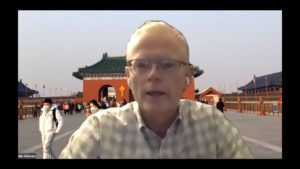
The new US president Biden is following closely his predecessor’s approach on China. Wrongly, says long-term China correspondent Ian Johnson in an opinion piece at the New York Times. “Washington’s plan appears to be to wait for the results of the comprehensive review of America’s national security policy toward China that Mr. Biden announced in February. This caution is a mistake,” says Johnson.
Ian Johnson:
Mr. Biden’s most effective attempt so far to reorient America’s China policy has been to re-energize U.S. alliances and international commitments. At a virtual summit last week, Mr. Biden and the leaders of Japan, India and Australia stressed the need for coordinated action to counterbalance China’s growing assertiveness in the Indo-Pacific region.
But that leaves unresolved almost all major bilateral issues, including: how to deal with the trade sanctions imposed by the Trump administration; China’s military expansion in the South China Sea; how to handle weapons sales to Taiwan; or what to do about Chinese tech giants, such as Huawei, that offer Western countries technology that is cheap but may be a Trojan horse for Chinese intelligence services.
Washington’s plan appears to be to wait for the results of the comprehensive review of America’s national security policy toward China that Mr. Biden announced in February. This caution is a mistake.
What’s needed are immediate low-rent measures to reverse the downward spiral in the two countries’ relations.
One, the Biden administration should offer to restart the Peace Corps and Fulbright scholarship programs in China, two key ways that Americans have learned about the country over the past decades. The Trump administration canceled both as part of an effort to isolate China. All that accomplished instead was to hurt America’s ability to train a new generation of scholars and analysts.
Two, in exchange for this, the U.S. government should stop vilifying China’s Confucius Institutes as sinister propaganda machines. These are largely cultural centers and much like educational outposts from other countries trying to push a good image of themselves. American universities should prevent Confucius Institutes from offering accredited courses — no university should allow a foreign government to set its curriculum — but the centers should be able to function off campus, much like Germany’s Goethe Institutes or British Councils do.
Three, the Biden administration should allow back into the United States some of the scores of Chinese journalists expelled by the Trump administration last year — provided that Beijing also agrees to welcome again accredited journalists from American news organizations and commits to not harassing them.
The Trump administration’s measures gutted America’s ability to understand China. China, by contrast, still has many reporters and diplomats, and tens of thousands of students in the United States.
Four, the U.S. government should lift restrictions on visas for Chinese Communist Party members wanting to travel to the United States. The policy was crafted to protect Americans from the C.C.P.’s supposedly malign influence. But the party counts some 90 million members, the majority of whom are civil servants doing normal jobs, not followers of some evil cult that needs to be kept at bay.
Finally, China should be invited to reopen its consulate in Houston, which the Trump team closed last year in retaliation for alleged espionage. In return, the Chinese government would allow the United States to reopen its consulate in Chengdu, which Beijing had closed in retaliation.
These are small measures, but they could be meaningful confidence-building steps and pave the way for more constructive exchanges later on thornier problems, such as the threat of war with Taiwan, conflicts in the South China Sea or industrial espionage.
Also: None of these measures are gifts; they require something in exchange. As such, they would serve as a test of Beijing’s willingness to improve relations. If Beijing turns them down, Washington will know much more clearly the scope of the problem.
Modest moves might seem less decisive than acting tough, but they are what, in the end, makes realpolitik real.
Ian Johnson is a speaker at the China Speakers Bureau. Do you need him at your (online)meeting or conference? Do get in touch or fill in our speakers’ request form.
Are you looking for more political analysts at the China Speakers Bureau? Do check out this list.
No comments:
Post a Comment